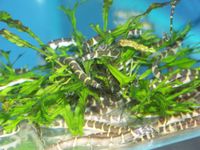Kuhli Loach (Pangio kuhlii)
From The Aquarium Wiki
(Redirected from Acanthophtalmus kuhli kuhli)
Kuhli Loach
Pangio kuhlii
76 Litres (20 US G.)
9-12 cm (3.5-4.7")
Freshwater
5.5 - 7.5
24.4-27.8°C (76 -82 °F)
1-13 °d
1:2 M:F
3-17 years
Family
Cobitidae
Contents
Additional names
- Coolie Loach, Kuhli Loach, Leopard Eel, Prickly Eye, Slimy Loach.
Additional scientific names
- Acanthophtalmus kuhli kuhli, Pangio kuhlii, Cobitis kuhlii
Origin[edit]
- From Asia, found from hill streams to lowland forest canals and streams.
Sexing[edit]
- Dorsal/ventral body differences: Think of the Kuhli's body cross-section as a figure-8 shape, dorsal over ventral. The males have a more "muscular" dorsal body contrasting with the females whose ventral body length is often bloated with green eggs. Additionally, the pectoral fins of the males are noticeably bigger and more paddle-shaped as well as being more likely to be pigmented to some degree, in contrast to the females.
Breeding[edit]
- Breeding is reportedly more common when a group of three to five pairs are present, as opposed to a single pair. Eggs are coloured green and are laid among the roots of floating plants such as water lettuce (Pistia stratiotes), or other plants near the surface. Duckweed may be a suitable and quickly-multiplying substitute.
- Males begin courtship by mouthing the vents of the female. The couple will entwine, then find appropriate plant cover in which to spawn. Groups may spawn together, or they may pair up separately. Adults may cannibalize eggs after spawning.
Tank compatibility[edit]
- Peaceful bottom feeder. Will tolerate any other peaceful fish as well as their own kind. Should be kept in groups of 4-5 or more, in smaller groups they will be very shy and spend most of their time hidden.
Diet[edit]
- Bottom feeder. Will eat most any food that sinks to the bottom. Fond of bloodworms and brine shrimp. Young fry may be fed microworms or newly-hatched brine shrimp (nauplii).
Feeding regime[edit]
- May be fed up to three times daily.
Environment specifics[edit]
- This fish requires places to hide or to burrow in, such as sand or gravel, caves, crevices in driftwood, or dense, low-lying plant cover.
Behaviour[edit]
- The Kuhli Loach is usually nocturnal, only sneaking out during feeding time to eat food that falls to the substrate, then quickly returning to its lair. Because of this, it is common to not see a Kuhli Loach for days or even weeks at a time. In aquaria with under-gravel filters, Kuhli Loaches may seek refuge under the filter plates. Members of this species may also explore other types of filters and hide in the filter media.
- In nature, Kuhli Loaches are social, though they do not form tight schools. While they can live by themselves, the Kuhli Loach would much rather shoal with members of their own species.
Identification[edit]
- There are two different colour variations of Kuhli Loach. The more widely pictured, but much less common "banded" Kuhli Loach, as well as the highly common "black" Kuhli Loach. The latter's colours may range from dark burgundy to a darker shade of tan. Albino versions are occasionally seen in shops.
Pictures[edit]
Videos[edit]
| Care: |
External links[edit]
- Fishbase (Mirrors:
 )
)




